虚拟语气的用法及经典练习题(附答案)
高一英语虚拟语气不同用法对比练习题40题答案解析版
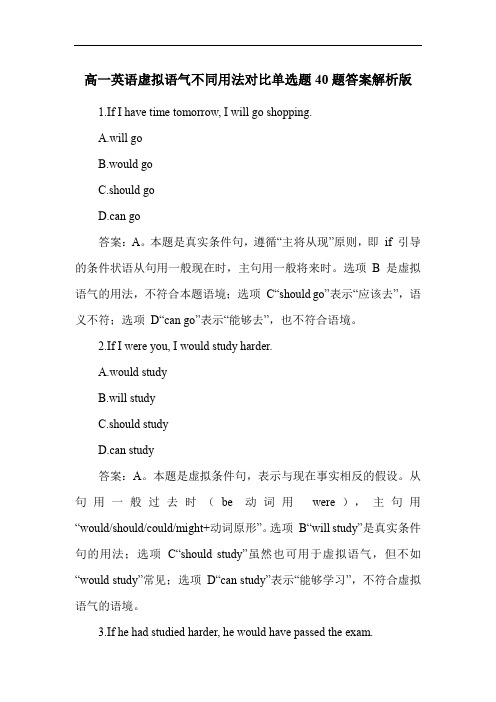
高一英语虚拟语气不同用法对比单选题40题答案解析版1.If I have time tomorrow, I will go shopping.A.will goB.would goC.should goD.can go答案:A。
本题是真实条件句,遵循“主将从现”原则,即if 引导的条件状语从句用一般现在时,主句用一般将来时。
选项B 是虚拟语气的用法,不符合本题语境;选项C“should go”表示“应该去”,语义不符;选项D“can go”表示“能够去”,也不符合语境。
2.If I were you, I would study harder.A.would studyB.will studyC.should studyD.can study答案:A。
本题是虚拟条件句,表示与现在事实相反的假设。
从句用一般过去时(be 动词用were),主句用“would/should/could/might+动词原形”。
选项B“will study”是真实条件句的用法;选项C“should study”虽然也可用于虚拟语气,但不如“would study”常见;选项D“can study”表示“能够学习”,不符合虚拟语气的语境。
3.If he had studied harder, he would have passed the exam.A.would have passedB.will passC.should passD.can pass答案:A。
本题是与过去事实相反的虚拟条件句。
从句用过去完成时,主句用“would/should/could/might+have+过去分词”。
选项B“will pass”是真实条件句或对未来的期望;选项C“should pass”语义不符;选项D“can pass”表示“能够通过”,不符合虚拟语气的要求。
4.If it rains tomorrow, we will stay at home.A.will stayB.would stayC.should stayD.can stay答案:A。
中考英语虚拟语气基础练习题40题带答案解析
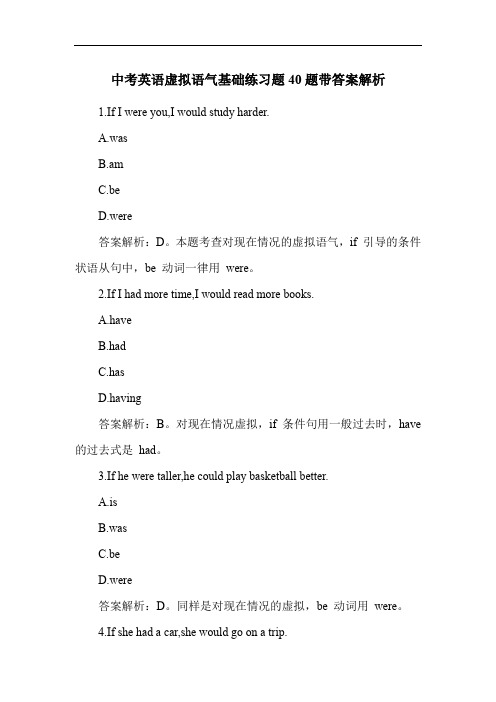
中考英语虚拟语气基础练习题40题带答案解析1.If I were you,I would study harder.A.wasB.amC.beD.were答案解析:D。
本题考查对现在情况的虚拟语气,if 引导的条件状语从句中,be 动词一律用were。
2.If I had more time,I would read more books.A.haveB.hadC.hasD.having答案解析:B。
对现在情况虚拟,if 条件句用一般过去时,have 的过去式是had。
3.If he were taller,he could play basketball better.A.isB.wasC.beD.were答案解析:D。
同样是对现在情况的虚拟,be 动词用were。
4.If she had a car,she would go on a trip.A.hasB.hadC.haveD.having答案解析:B。
条件句对现在虚拟,用一般过去时,had 是have 的过去式。
5.If we had enough money,we would buy a new house.A.haveB.hadC.hasD.having答案解析:B。
对现在情况虚拟,have 的过去式had。
6.If I were a bird,I could fly in the sky.A.wasB.amC.beD.were答案解析:D。
对现在虚拟,be 动词用were。
7.If he had free time,he would watch movies.A.hasB.hadC.haveD.having答案解析:B。
条件句对现在虚拟,用had。
8.If she were a singer,she would sing beautiful songs.A.isB.wasC.beD.were答案解析:D。
对现在情况虚拟,be 动词用were。
高一英语虚拟语气运用练习题40题含答案解析
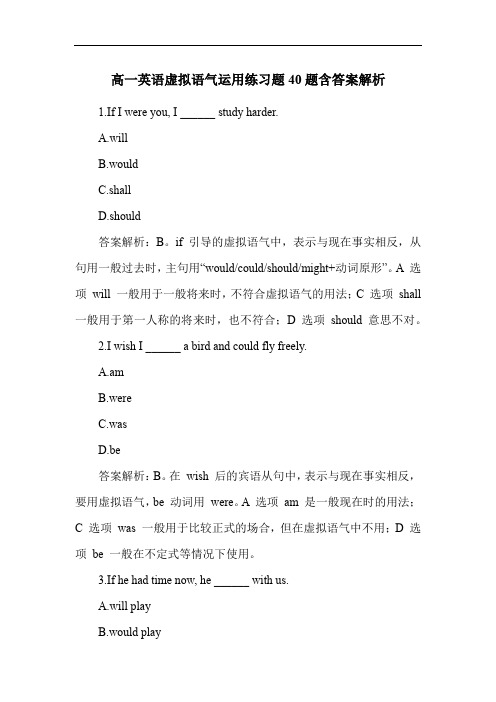
高一英语虚拟语气运用练习题40题含答案解析1.If I were you, I ______ study harder.A.willB.wouldC.shallD.should答案解析:B。
if 引导的虚拟语气中,表示与现在事实相反,从句用一般过去时,主句用“would/could/should/might+动词原形”。
A 选项will 一般用于一般将来时,不符合虚拟语气的用法;C 选项shall 一般用于第一人称的将来时,也不符合;D 选项should 意思不对。
2.I wish I ______ a bird and could fly freely.A.amB.wereC.wasD.be答案解析:B。
在wish 后的宾语从句中,表示与现在事实相反,要用虚拟语气,be 动词用were。
A 选项am 是一般现在时的用法;C 选项was 一般用于比较正式的场合,但在虚拟语气中不用;D 选项be 一般在不定式等情况下使用。
3.If he had time now, he ______ with us.A.will playB.would playC.shall playD.should play答案解析:B。
if 引导的虚拟语气中,表示与现在事实相反,从句用一般过去时,主句用“would/could/should/might+动词原形”。
A 选项will play 一般用于一般将来时,不符合虚拟语气的用法;C 选项shall play 一般用于第一人称的将来时,也不符合;D 选项should play 意思不对。
4.She would be happy if she ______ more friends.A.hasB.hadC.haveD.having答案解析:B。
if 引导的虚拟语气中,表示与现在事实相反,从句用一般过去时,主句用“would/could/should/might+动词原形”。
中考英语虚拟语气运用练习题30题含答案解析
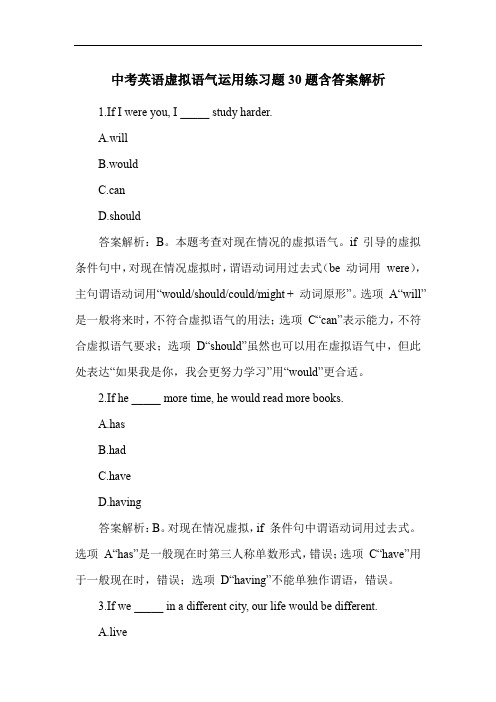
中考英语虚拟语气运用练习题30题含答案解析1.If I were you, I _____ study harder.A.willB.wouldC.canD.should答案解析:B。
本题考查对现在情况的虚拟语气。
if 引导的虚拟条件句中,对现在情况虚拟时,谓语动词用过去式(be 动词用were),主句谓语动词用“would/should/could/might + 动词原形”。
选项A“will”是一般将来时,不符合虚拟语气的用法;选项C“can”表示能力,不符合虚拟语气要求;选项D“should”虽然也可以用在虚拟语气中,但此处表达“如果我是你,我会更努力学习”用“would”更合适。
2.If he _____ more time, he would read more books.A.hasB.hadC.haveD.having答案解析:B。
对现在情况虚拟,if 条件句中谓语动词用过去式。
选项A“has”是一般现在时第三人称单数形式,错误;选项C“have”用于一般现在时,错误;选项D“having”不能单独作谓语,错误。
3.If we _____ in a different city, our life would be different.A.liveB.livedC.will liveD.would live答案解析:B。
对现在情况虚拟,条件句谓语动词用过去式。
选项A“live”是一般现在时,错误;选项C“will live”是一般将来时,错误;选项D“would live”是对过去情况虚拟时主句的形式,错误。
4.If she _____ taller, she could play basketball better.A.isB.wasC.wereD.be答案解析:C。
对现在情况虚拟,be 动词用were。
选项A“is”是一般现在时,错误;选项B“was”一般过去时,且在虚拟语气中只用于主语是I/he/she/it 的情况下,此处主语是she,应该用were;选项D“be”不能单独作谓语,错误。
虚拟语气的练习题加答案
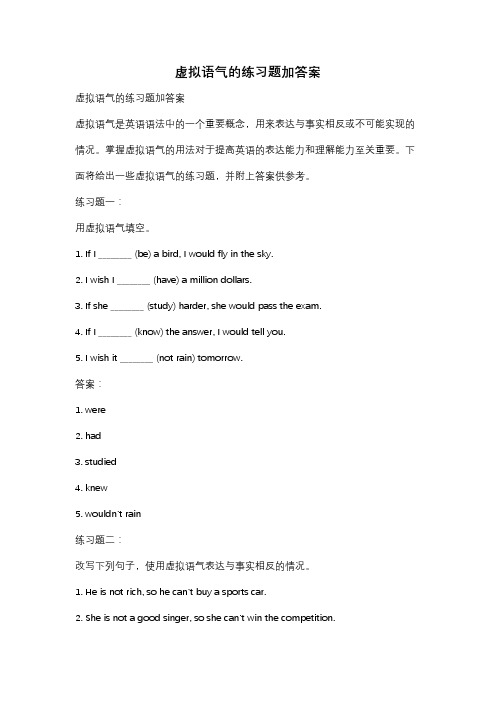
虚拟语气的练习题加答案虚拟语气的练习题加答案虚拟语气是英语语法中的一个重要概念,用来表达与事实相反或不可能实现的情况。
掌握虚拟语气的用法对于提高英语的表达能力和理解能力至关重要。
下面将给出一些虚拟语气的练习题,并附上答案供参考。
练习题一:用虚拟语气填空。
1. If I ________ (be) a bird, I would fly in the sky.2. I wish I ________ (have) a million dollars.3. If she ________ (study) harder, she would pass the exam.4. If I ________ (know) the answer, I would tell you.5. I wish it ________ (not rain) tomorrow.答案:1. were2. had3. studied4. knew5. wouldn't rain练习题二:改写下列句子,使用虚拟语气表达与事实相反的情况。
1. He is not rich, so he can't buy a sports car.2. She is not a good singer, so she can't win the competition.3. They didn't study hard, so they failed the test.4. I don't have a passport, so I can't travel abroad.5. It's not warm, so we can't go swimming.答案:1. If he were rich, he could buy a sports car.2. If she were a good singer, she could win the competition.3. If they had studied hard, they wouldn't have failed the test.4. If I had a passport, I could travel abroad.5. If it were warm, we could go swimming.练习题三:选择正确的虚拟语气形式填空。
虚拟语气练习题及答案
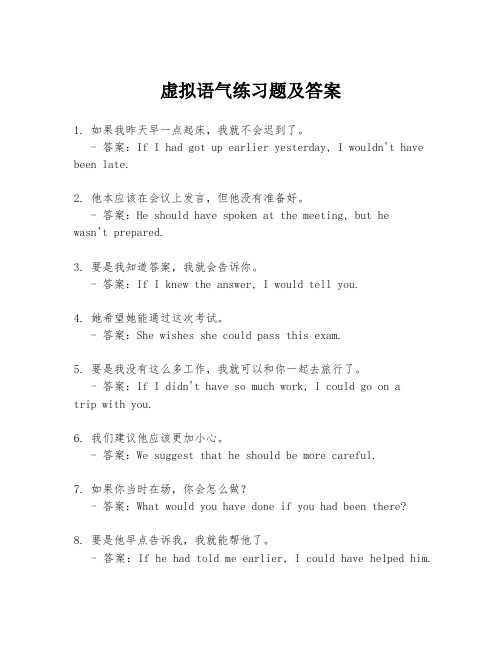
虚拟语气练习题及答案1. 如果我昨天早一点起床,我就不会迟到了。
- 答案:If I had got up earlier yesterday, I wouldn't have been late.2. 他本应该在会议上发言,但他没有准备好。
- 答案:He should have spoken at the meeting, but hewasn't prepared.3. 要是我知道答案,我就会告诉你。
- 答案:If I knew the answer, I would tell you.4. 她希望她能通过这次考试。
- 答案:She wishes she could pass this exam.5. 要是我没有这么多工作,我就可以和你一起去旅行了。
- 答案:If I didn't have so much work, I could go on atrip with you.6. 我们建议他应该更加小心。
- 答案:We suggest that he should be more careful.7. 如果你当时在场,你会怎么做?- 答案:What would you have done if you had been there?8. 要是他早点告诉我,我就能帮他了。
- 答案:If he had told me earlier, I could have helped him.9. 我本应该更加努力地学习。
- 答案:I should have studied harder.10. 要是他没有生病,他就能参加比赛了。
- 答案:If he hadn't been sick, he could haveparticipated in the competition.答案解析- 虚拟语气通常用于表示与现实相反的情况,或者表达愿望、建议等。
- 虚拟语气的构成通常包括“if”引导的条件句和主句中的“would/should/could/might + 动词原形”。
中考英语虚拟语气运用练习题题30题答案解析版
中考英语虚拟语气运用完形填空题30题答案解析版1If I had more time, I would be able to do many things. I would read more books. I would learn a new language. I would play sports more often.I would spend more time with my friends. I would also travel to different places.1. If I had more time, I ___ read more books.A. wouldB. willC. canD. could答案:A。
解析:与现在事实相反的虚拟语气,主句用“would + 动词原形”,所以选A。
B 选项will 用于一般将来时,C 选项can 表示能力,D 选项could 虽然也可表示能力或可能性,但在此处不符合虚拟语气的用法。
2. I ___ learn a new language if I had more time.A. wouldB. willC. canD. could答案:A。
解析:同样是与现在事实相反的虚拟语气,主句用“would + 动词原形”,选A。
B 选项will 用于一般将来时,C 选项can 表示能力,D 选项could 可表示能力或可能性,但不符合虚拟语气的用法。
3. If I had more time, I ___ play sports more often.A. wouldB. willC. canD. could答案:A。
解析:与现在事实相反的虚拟语气,主句用“would + 动词原形”,选A。
B 选项will 用于一般将来时,C 选项can 表示能力,D 选项could 可表示能力或可能性,但不符合虚拟语气的用法。
4. I ___ spend more time with my friends if I had more time.A. wouldB. willC. canD. could答案:A。
高三英语虚拟语气特殊用法练习题40题答案解析版
高三英语虚拟语气特殊用法练习题40题答案解析版1. If I had studied harder in history class, I ______ more about the causes of the Industrial Revolution now.A. knowB. would knowC. knewD. had known答案:B解析:这是一个错综时间条件句。
从句中“had studied”是对过去的虚拟,表示过去没有努力学习。
主句中有“now”,是对现在情况的虚拟,在虚拟语气中,对现在情况虚拟时,主句要用“would + 动词原形”结构。
所以这里应该选B,表示如果过去努力学习了,现在就会对工业革命的起因知道得更多。
2. Had he not been so brave during the war, his family ______ in great danger at that time.A. would beB. will beC. would have beenD. is答案:C解析:这是一个省略了if的虚拟条件句,正常语序是“If he had not been so brave during the war”,是对过去情况的虚拟。
在这种情况下,主句要用“would + have + 过去分词”结构,所以选C,表示如果他在战争中不那么勇敢,他的家人当时就会处于极大的危险之中。
3. If she were to start the project today, she ______ it in a completely different way considering the new technology available.A. will planB. would planC. plannedD. has planned答案:B解析:这是一个对将来情况虚拟的句子,“were to + 动词原形”是对将来虚拟的一种结构。
虚拟语气总结附练习及答案
虚拟语气简介虚拟语气用来表示说话人的主观愿望或假想,而不表示客观存在的事实,所说的是一个条件,不一定是事实,或与事实相反。
虚拟语气通过谓语动词的特殊形式来表示。
英语中的语气分为陈述语气、祈使语气、虚拟语气三类。
在表示虚假的、与事实相反的或难以实现的情况时用虚拟语气,表示主观愿望或某种强烈情感时,也用虚拟语气。
即当一个人说话时欲强调其所说的话是基于自己的主观想法,愿望,假想,猜测,怀疑或建议,而不是根据客观实际,就用虚拟语气。
①错综时间条件句:当条件状语从句表示的行为和主句表示的行为所发生的时间不一致时,被称为错综时间条件句,动词的形式要根据它表示的时间作出相应的调整。
如:If you had followed my advice just now, you would be better now.If you had studied hard before, you would be a college student now.②if省略句在条件句中可以省略if, 把were, had, should提到句首,变成倒装句式。
如:If I were at school again, I would study harder.→Were I at school again, I would study harder.如果我还有上学的机会,我会更加努力学习。
If you had come earlier, you would catch the bus.→Had you come earlier, you would catch the bus.如果你来得早点,你就能赶上公共汽车。
If it should rain tomorrow, we would not go climbing.→Should it rain tomorrow, we would not go climbing.如果明天下雨的话,我们就不能登山去了。
初二英语虚拟语气用法练习题20题答案解析版
初二英语虚拟语气用法练习题20题答案解析版1. If I ____ a bird, I would fly to the moon.A. amB. wasC. wereD. are答案解析:C。
在虚拟语气的条件句中,表示与现在事实相反的假设时,be动词一律用were,不管主语是第几人称。
选项A am是一般现在时的形式,不符合虚拟语气的语法规则;选项B was虽然是be 动词的过去式,但在虚拟语气中这种用法错误;选项D are是一般现在时的复数形式,也不符合虚拟语气语法。
2. If he ____ more time, he would learn to play the piano.A. hasB. hadC. haveD. having答案解析:B。
这是一个与现在事实相反的虚拟条件句。
在这种情况下,从句要用一般过去时,这里的主语是he,所以要用had。
选项A has是一般现在时的第三人称单数形式,不符合虚拟语气语法;选项C have是一般现在时的复数形式,错误;选项D having不是谓语动词形式,不能用于此处。
3. If she ____ to the party last night, she would have met her favoritestar.A. goB. goesC. wentD. had gone答案解析:D。
本题是一个与过去事实相反的虚拟条件句。
在这种情况下,从句要用过去完成时。
原句中提到last night表示过去的时间,所以要用had gone。
选项A go是一般现在时的原形,不符合要求;选项B goes是一般现在时的第三人称单数形式,错误;选项C went是一般过去时,不能表达与过去事实相反的虚拟条件句中的从句时态。
4. If they ____ here now, they could help us.A. areB. wereC. wasD. is答案解析:B。
- 1、下载文档前请自行甄别文档内容的完整性,平台不提供额外的编辑、内容补充、找答案等附加服务。
- 2、"仅部分预览"的文档,不可在线预览部分如存在完整性等问题,可反馈申请退款(可完整预览的文档不适用该条件!)。
- 3、如文档侵犯您的权益,请联系客服反馈,我们会尽快为您处理(人工客服工作时间:9:00-18:30)。
虚拟语气概念虚拟语气用来表示说话人的主观愿望或假想,而不表示客观存在的事实,所说的是一个条件,不一定是事实,或与事实相反。
虚拟语气通过谓语动词的特殊形式来表示。
英语中的语气分为陈述语气、祈使语气、虚拟语气三类。
应用条件在表示虚假的、与事实相反的或难以实现的情况时用虚拟语气,表示主观愿望或某种强烈情感时,也用虚拟语气。
即当一个人说话时欲强调其所说的话是基于自己的主观想法,而不是根据客观实际,就用虚拟语气。
在非真实条件状语从句中的用法真实条件状语从句与非真实条件状语从句条件句可分为两类,一类为真实条件句,一类为非真实条件句。
非真实条件句表示的是假设或实际可能性不大的情况,故采用虚拟语气。
例:If he doesn’t hurry up, he will miss the bus. 如果他不快点,他将错过巴士。
( 真实)If he is free, he will ask me to tell stories. 如果他是空闲的,他会要求我讲故事。
(真实)If I were you, I would go at once.如果我是你,我马上就会去。
(非真实,虚拟语气)If there were no air, people would die. 如果没有空气,人就会死亡。
(非真实,虚拟语气)用法及动词形式例句:1、表示与现在事实相反的情况:例: 1. If I were you, I would take an umbrella.如果我是你,我会带把伞。
(事实:我不可能是你) 2.If I knew his telephone number, I would tell you.如果我知道他的电话号码,我就会告诉你。
(事实:不知道) 3.If there were no air or water, there would be no living things on the earth.如果没有水和空气,地球上就不会有生物。
(事实:地球上既有空气也有水) 4.If I had any money with me, I could lend you some.如果我带钱了,我就会借给你些。
(事实:没带钱) 5.If he studied harder, he might pass the exam.如果他再努力些,就能通过考试了。
(事实:没有努力)2、表示与过去事实相反的情况例:1. If I had gotten there earlier, I should/could have met her. 如果我早到那儿,我就会见到她。
(事实:去晚了) 2.If he had taken my advice, he would not have made such a mistake. 如果他听我的劝告的话,就不会犯这样的错误了。
(事实:没有听我的话)3、表示对将来情况的主观推测,与将来事实相反例:1.If he should come here tomorrow, I should/would talk to him.如果他哪天来这儿的话,我就跟他谈谈。
(事实:来的可能性很小) 2.If there were a heavy snow next Sunday, we would not go skating.如果下周日下大雪,我们就不能去滑冰了。
(事实:不知能否下雪) 3.If she were to be there next Monday, I would tell her about the matter.如果她下周一来这儿的话,我就会告诉她这件事的始末。
4、有时,虚拟条件句中,结果主句和条件从句的谓语动作若不是同时发生时,虚拟语气的形式应作相应的调整。
①从句的动作与过去事实相反,而主句的动作与现在或现在正在发生的事实不符。
如:If I had worked hard at school, I would be an engineer, too.如果我在学校学习刻苦的话,我现在也会成为一个工程师了If they had informed us, we would not come here now.如果他们通知过我们的话,我们现在就不会来这里了。
②从句的动作与现在事实相反,而主句的动作与过去事实不符。
如:If he were free today, we would have sent him to Beijing.如果他今天有空的话,我们会已经派他去北京了。
If he knew her, he would have greeted her.要是他认识她的话,他肯定会去问候她了。
5、当虚拟条件句的谓语动词含有were, should, had时,if可以省略,这时条件从句要用倒装语序,即将were, should, had等词置于句首,这种多用于书面语。
如:Should he agree to go there, we would send him there.要是他答应去的话,我们就派他去。
Were she here, she would agree with us.如果她在这儿的话,她会同意我们的。
Had he learnt about computers, we would have hired him to work here.如果他懂一些电脑知识的话,我们已经聘用他来这里工作了。
6、非真实条件句中的条件从句有时不表达出来,只暗含在副词、介词短语、上下文或其他方式表示出来,这种句子叫做含蓄条件句,在多数情况下,条件会暗含在短语中,如without…., but for….等如:But for his help, we would be working now.要不是他的帮助,我们还会在工作呢。
Without your instruction, I would not have made such great progress.要是没有你的指导,我不会取得如此大的进步。
We didn’t know his telephone number; otherwise we would have telephoned him.我们不知道他的电话号码,否则我们就会给他打电话。
7、有时,虚拟条件句中,主、从句可以省略其中的一个,来表示说话人的一种强烈的感情。
①省略从句He would have finished it. 他本该完成了。
You could have passed this exam. 你应该能通过这次考试了。
②省略主句If I were at home now. 要是我现在在家里该多好啊。
If only I had got it. 要是我得到它了该多好啊。
、虚拟语气的其他用法用在wish 后的宾语从句a、表示与现在事实相反的愿望,谓语动词用过去式eg. I wish I had your brains.我希望我有你那样的头脑。
(事实:我根本比不上你)b、表示与过去事实相反的愿望,谓语动词:had+doneeg: I wish I had known the truth of the matter.我希望我原来知道这件事的真相。
(事实:原来不知道)c、表示将来难以实现的愿望,谓语动词:should/would + 动词原形eg. I wish I should have a chance again.我希望我还能有一次这样的机会。
(事实:很难再有这样的机会了)(注:if only和as if/as though也有相同用法)用在目的状语从句中1.在for fear that, in case, lest引导的从句中,若用虚拟语气时,从句谓语为:should + 动词原形。
并且should不能省略eg.She examined the door again for fear that a thief should come in.她又把门检查了一遍,以防盗贼的进入。
He started out earlier lest he should be late.他很早就出发了以防迟到。
2、在so that, in order that所引导的目的状语从句中,从句中的谓语为:can / may / could / might / will / would / should + 动词原形。
eg.He goes closer to the speaker so that he can hear him clearer. 他走近说话的人以便能听得更清楚。
He read the letter carefully in order that he should not miss a word. 他把信读得很仔细以便不漏掉一个单词。
其他用法1、一想要(desire)二宁愿(prefer)三命令(order, command)四建议(advice. Suggest, propose)五要求(demand , require, request , desire , insist)中,无论主句谓语动词为何种时态,从句的谓语动词都用:“should + 动词原形”或只用“动词原形”。
如:He suggested that we (should) take the teacher’s advice. He insisted that we (should) take the teacher’s advice.He demand that we (should) take the teacher’s advice.He ordered that we (should) take the teacher’s advice.insist如果翻译成坚持某种动作才用虚拟语气;翻译成坚持某种观点就不用虚拟语气。
如:He insist he is a student.他坚持说他是个学生。
这个语句表示的是事实,因此在这个语句中不能使用虚拟语气。
suggest意为“建议”才用虚拟语气,意为“暗示”则不用虚拟语气。
如:His face suggests that he looks worried .他的表情暗含着他很担心。
这个句子本身是事实,因此它就没有用到虚拟语气。
2、表情绪.观点的形容词或名词也要用虚拟语气.如:necessary、important、impossible、natural、strange、surprising、funny、right、wrong、better、a pity 等。
句型:It is.......that +主语从句,从句的谓语动词都要用should+原型或只用动词原型。
